- Home
- Sherry Thomas
A Study In Scarlet Women Page 8
A Study In Scarlet Women Read online
Page 8
Shrewsbury hesitated. Lord Ingram did not further prompt him. Shrewsbury’s gloved hand opened and closed around the top of his walking stick. Opened and closed again.
One of their classmates walked by and inclined his head. They both nodded in return. Thunder rumbled, then cracked. Shrewsbury jumped. Lord Ingram remained stock-still.
Shrewsbury cleared his throat. “Ash—that is, my lord—”
He had never before called Lord Ingram “my lord,” except jokingly. But this was no jest. This was Shrewsbury acknowledging his new place, that of a mere acquaintance no longer accorded the privilege of addressing Lord Ingram as an intimate.
“My lord, I wonder if you would—ah—possibly—be so kind as to pass on a word for me.”
Lord Ingram only looked at him.
Shrewsbury put a hand at the back of his neck and cleared his throat again. “You see I feel terrible about what happened. I feel even worse now that I heard Miss Charlotte Holmes has run off on her own.
“Most of London is no place for a genteelly brought up young lady. It’s bone-chilling, thinking about the mishaps that could befall her. I want to help—or at least mitigate my part in the whole . . . fiasco. But I can’t approach her family or any of her lady friends—you know how it is. So I thought, well, perhaps she might come to you for aid. You two used to be thick as thieves, even if that was a while ago.”
“I have not heard from Miss Holmes since the fiasco,” said Lord Ingram.
“But you might in the future, mightn’t you? If you do, please let her know that I’ll be more than happy to put her up in a safe place and, well, look after her.”
“And how would she reciprocate your kindness?” Lord Ingram’s words were even, almost good-natured.
“She was . . . she was willing to be my . . . paramour before. I . . . ah . . . I assume that hasn’t changed.”
“I see,” said Lord Ingram, his tone even more kindly. “Should Miss Holmes seek my help, I will remember to point her in your direction. Would that be all?”
Roger Shrewsbury’s throat moved. “I know you want to punch me. Why don’t you? Go ahead!”
Lord Ingram lifted a surprised brow. “Mr. Shrewsbury, I’m a married man. I don’t know about Mrs. Shrewsbury, but Lady Ingram would not care to hear that I brawled over another woman.”
Roger Shrewsbury flushed to the tops of his ears. “Of course. Of course. Please forgive me.”
Lord Ingram nodded. “My condolences.”
He turned and walked away.
Roger Shrewsbury would never know how close he had come to being thrashed within an inch of his life.
Lord Ingram looked up from his cufflinks. “Yes, Cummings?”
“I’ve saved the article on Mr. Holmes from the paper,” said his valet. “May I assume you’ll have no more use for the rest of it, my lord?”
Lord Ingram stilled. He had purchased a West Country paper before his return journey, which had sat next to him on the train, unread, as he stared out of the window for hours on end. He vaguely recalled leaving Paddington Station with the paper in hand.
“You may dispose of the paper as you see fit.”
“Very good, sir. I have left the article in your dressing room.”
Lord Ingram waited until his valet had left before heading to the dressing room. Cummings handled the posting and collection of his correspondence from time to time, so it wasn’t surprising that he would remember Sherlock Holmes. But why in the world was there an article about Holmes in the paper—a West Country paper, no less?
The newspaper clipping had for its headline
INQUEST ADJOINED AWAITING FURTHER EVIDENCE.
Lord Ingram frowned as he read the opening account of Mr. Harrington Sackville’s death. Sackville. He had heard the name in passing at Lady Shrewsbury’s funeral. Lord Sheridan’s long-lost brother, whom no one had seen for many years. Lord Ingram didn’t know the man, but the general reaction seemed to have been surprise—of the so-he-was-still-alive-as-of-recently variety.
Inquest testimonies from physicians and Sackville’s household retainers were recorded verbatim in the paper; everything seemed more or less straightforward—and nothing had anything to do with Sherlock Holmes.
Had Cummings clipped the wrong article?
At the end of witness testimonies, the coroner read the following letter from Mr. Sherlock Holmes of London.
Lord Ingram swore.
Dear Sir,
It has come to my attention that Mr. Harrington Sackville’s death, by apparent overdose of chloral, may not be an isolated incident: Lady Amelia Drummond preceded him in death by a week and a half; the Dowager Baroness Shrewsbury followed a mere twenty-four hours later. Lady Amelia was first cousin to Mr. Sackville’s elder brother by the same father, Lord Sheridan, and godmother to one of Baroness Shrewsbury’s children.
All three deaths were unforeseen. As was true in Mr. Sackville’s case, Lady Amelia and Lady Shrewsbury, too, had been in excellent health and spirits. They all perished overnight. The only difference is that Mr. Sackville’s maid came across him while he still drew breaths, albeit weakly, which gave the household sufficient time to fetch a physician and for the physician to diagnose an overdose of chloral, even if that diagnosis came too late for anything to be done.
Had the maid not tried to rouse him, he would have been found dead, and the cause of death would most likely have been given as failure of the heart or an aneurysm of the brain—causes set down on the death certificates of Lady Amelia Drummond and Lady Shrewsbury, respectively. And his passing, however unexpected, would have been treated much in the same manner as theirs, attracting its share of gossip and speculation but no legal notice.
Each death, taken singly, may be accepted as unfortunate but not suspicious. However, the proximity of all three, not only in time, but in their social and familial connection, becomes difficult to ignore.
I urge you, sir, to share this intelligence with your jury.
Yours truly,
Sherlock Holmes
Lord Ingram swore again. By tomorrow the news would be in all the London rags. Holmes never once mentioned the word, but how long before speculations leaped from mere suspicious deaths to the most conspiratorial of murders? He didn’t want to imagine the bedlam that would be unleashed.
Was this circus but a sleight of hand on Holmes’s part, to draw the glare of unwanted attention away from a certain beleaguered relation? No. If a diversion had been all that was required, Holmes would have accomplished it without provoking a public uproar.
He read the letter again, pressing two fingers against the center of his forehead. Holmes believed that something was wrong—believed it enough to write from the wasteland of exile, in the hope of influencing the outcome of the inquest.
Lord Ingram closed his eyes, but it was no use. He was too accustomed to giving Holmes everything he could, always with a sense of urgency. And a sense of futility: What Holmes wanted most was beyond his power.
Some people never meet the right person in life. They, on the other hand, met when they were too young to realize what they had found in each other. And when they did at last see the light, it was too late.
He tossed aside the newspaper clipping and headed for the front door.
“My lord!”
Inspector Treadles found himself a little uncertain at the appearance of Lord Ingram in his parlor. It wasn’t yet late, but it was after dinner and he hadn’t anticipated any social visits, let alone one from his lordship.
Lord Ingram inclined his head. “Mrs. Treadles, Inspector, I hope I haven’t disturbed you in your hour of repose.”
“Of course not.” Alice rose from her seat and shook Lord Ingram’s hand. “Do please sit down and let us know what brought you here.”
“This brought me here.” Lord Ingram handed over a large-ish newspaper clipping
that had been carefully folded. “If you will do me the honor of reading the article to the end.”
Alice rang for tea. Then she and Treadles sat down with the article. They gasped at almost the same time, upon the first mention of Sherlock Holmes. Treadles sucked in another breath as he reached the conclusion of the letter.
“Does this mean that Holmes is well again?” he asked. “Or is this from before his misfortune?”
“I have no way of ascertaining—Holmes remains beyond reach.” Lord Ingram’s gaze strayed to the mantel and lingered on a photograph of the Treadleses and himself, taken on the Isles of Scilly, in those days when Holmes was only a quick note away. “But it doesn’t take a mind of extraordinary caliber to deduce that this must be important to Holmes.
“I understand Mr. Sackville’s death took place outside the Metropolitan Police’s district of authority. But I also understand that it is not unusual for county police to request help from the C.I.D., especially in case of suspicious deaths, where there isn’t enough local expertise to handle the investigation.” He looked back at Treadles. “Inspector, may I ask that you personally inquire into the matter?”
Treadles glanced at his wife, who gave a small nod. “Certainly, my lord. I will send a cable to some friends serving with the Devon Constabulary first thing tomorrow morning.”
Lord Ingram exhaled. “Thank you, Inspector. I am most obliged.”
My Dear Lord Ingram,
As soon as I arrived in Scotland Yard this morning, I learned that the Devon Constabulary has requested assistance from the C.I.D. with regard to Mr. Sackville’s case. I have volunteered my services.
I can only hope I shall not disappoint Sherlock Holmes.
Your servant,
Robert Treadles
Seven
“No letters for you, miss,” said the post office clerk to Charlotte.
Charlotte thanked him, yielded her place, and walked across the cavernous, impersonal interior of the post office. She was fine until she reached the third pillar from the door, and then her lungs collapsed.
She couldn’t breathe. She couldn’t move. Her nails dug into the palms of her hands as she broke out in a cold sweat. Imminent heart failure—she recognized all the symptoms. Dear God, what would happen to Livia? And what would the man she couldn’t stop caring about think, when he learned that she’d met her end at the General Post Office on St. Martin’s Le Grand, of all places?
Two minutes later, still very much on her feet and not lying in a heap on the floor, she began to realize that what ailed her wasn’t the spear point of mortality, but the onset of panic.
She had never felt panic in her life. Livia sometimes did, when she imagined, in excruciating detail, ending up an indigent old maid unwanted by any and all relations, spending her days in a grimy boardinghouse, subsisting on only bread and boiled cabbage.
When Livia fell into one of her states of uncontrollable anxiety—or climbed into one, as Charlotte sometimes thought—Charlotte would bring her a heaping plate of buttered toast and hot tea laced with brandy. She would rub Livia’s back. And then she would read aloud passages from Jane Eyre, Livia’s favorite book, a work Charlotte couldn’t otherwise get through, finding it too dense with high emotion and melodrama.
But even though she did all these sisterly things, she never did feel any of Livia’s fear and anguish. It had seemed utterly incomprehensible that a future decades distant, built of nothing but worst-case scenarios, should hold such sway over the here and now.
Until this moment.
Until the weight of all her choices descended upon her with the force and tonnage of a landslide.
What if the investigation into Mr. Sackville’s death unearthed nothing? What if the truth remained obscured and Livia was forever branded an unprosecuted murderer because of a drunken spat?
Fear swelled, crushing her organs to make room for more of itself. It squeezed the air out of her lungs. It coiled, pythonlike, around her stomach. It forced its way up her windpipe, pushing, expanding, blocking every last sliver of open passage.
She had always been certain that she’d be able to take care of Livia in addition to herself. She never thought she would wreck both their lives simultaneously.
She had not made up out of whole cloth the more numerous opportunities open to women these days. Nor had she conjured from thin air those societies that existed to connect women in need of employment with employers in need of positions filled.
But a good portion of those organizations, for all their good and noble intentions, were thinly funded. Two of those she visited had already closed permanently, with another still nominally in operation, but taking applications only by post. The ones that appeared to be in more robust shape all required letters of character written by ladies of good standing—those Charlotte would never have, but those didn’t concern her so much: She was passable at imitating handwriting and did not consider it a moral failing for a woman in her situation to forge her own recommendations.
Of a far greater worry was that to receive help from those societies, she had to first pay a subscription fee, which her already thin wallet could ill afford—not if she wanted to eat and have a roof over her head, too. And then, were she determined enough to pay the fee, she could expect to wait weeks, possibly months, before a suitable position turned up.
She didn’t have that kind of time.
It wasn’t so dire yet. Not at the moment. But just as Livia looked down the years and saw nothing but misery and loneliness at the end of the road, Charlotte could not get rid of this stone-hard dread of coming to the last of her pennies.
Her room and board was nine shilling six a week. After paying for the first two weeks, she had five pounds three and ten left, including what Livia had given her. That amount had been further reduced after the purchase of the daily necessities—not to mention she had to provide for her own lunches.
The money would not last forever. It would not even last very long. And then what? If she couldn’t look after herself, how would she begin to help Livia?
“Are you all right, miss?”
An almost comically resplendent creature stood before Charlotte, in a polonaise of lustrous Prussian blue silk, worn over an elaborately ruffled white underskirt. Her hat was narrow brimmed and high crowned, laden with sprays of ornamental grass against which nestled a . . . a stuffed blue-breasted parrotfinch, if Charlotte wasn’t entirely wrong about her ornithology.
She realized that she’d been standing with her back against a forty-foot-high column, her hand over her chest. She dropped that hand. “Yes, I’m fine. Thank you, ma’am. It’s the weather, a bit hot today.”
“It has been rather warm lately,” said the woman. Her voice was of a startling loveliness, rich as cream, with a barely perceptible hint of huskiness. “Should I ask someone to fetch you a glass of water, miss? Or find you a place to sit down for a minute, in peace and quiet, away from nosy old ladies such as myself?”
The woman chuckled at her own joke. Until she did so, Charlotte had thought her in her mid-to-late thirties. But her mirth revealed webs of crow’s feet around her eyes and deep channels to either side of her lips: She was a woman at least fifty years of age.
Her money was new: No one who’d been raised to follow the unspoken standards of Society, not even a woman with Charlotte’s “magpie tastes,” as Livia called them, would sport so elaborate and fanciful a confection for an outing to the post office.
She wore no wedding band. But that, Charlotte decided, was not because she had never been married. The parrotfinch on the hat was perched on a little nest made of black crape. The same material formed a most discreet border around the blue reticule the woman held in her hand.
Women only wore black crape if they had lost their husbands. And the woman here, despite her extravagantly exuberant day dress, wished to honor her late spouse in a subtle manner, nea
rly invisible expressions of grief and remembrance woven into her daily attire.
Charlotte shook her head at herself, at her ingrained tendency to observe those she came across to the very last detail. She enjoyed it and she was good at it. But what use was it?
What use was a woman with a mind and a temperament that would be odd and borderline worrisome even in a man?
She forced a smile. “Thank you, ma’am, but I really am quite all right. Nothing is the matter with me at all.”
After the woman sashayed away to conduct her business with the post office—her progress followed by all the men and most of the women in a twenty-five-foot radius—Charlotte pulled herself together and left.
Perhaps it was nothing more than hunger. Feeling the pinch of imminent penury, she had saved two slices of buttered toast from breakfast. But she had wanted to see whether she would still be able to function as usual without eating them for lunch. It had been a long day of walking about London, and she had two and a half more miles to go before she reached her little room at Mrs. Wallace’s. She grew increasingly sure that if she could only set a kettle to boil, and put the slices of toast in her stomach where they belonged, she wouldn’t feel nearly so dispirited.
Not to mention that Miss Whitbread had kindly loaned her a half dozen magazines. Charlotte had already found two interesting travelogue pieces—one on the fjords of Norway and the other about the Canary Islands. A cup of tea, a bite to eat, even if it was from morning, and a chance to forget her troubles by vicariously living another woman’s holiday—
“A penny, mum? A penny please?”
The plaintive cry of a child beggar yanked Charlotte back to the unhappy here and now. The girl was small and hollow cheeked. Her face and her outstretched hand were coated with grime, her frock such a hodgepodge of brown and grey patches that Charlotte couldn’t tell what its original color had been.

_preview.jpg) Claiming the Duchess (Fitzhugh Trilogy Book 0.5)
Claiming the Duchess (Fitzhugh Trilogy Book 0.5)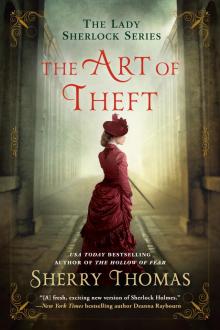 The Art of Theft
The Art of Theft The Magnolia Sword: A Ballad of Mulan
The Magnolia Sword: A Ballad of Mulan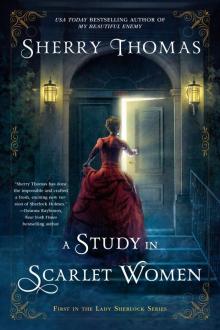 A Study In Scarlet Women
A Study In Scarlet Women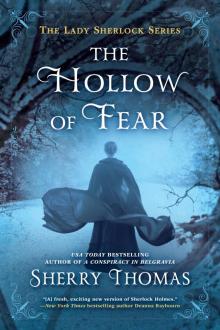 The Hollow of Fear
The Hollow of Fear The Magnolia Sword
The Magnolia Sword Beguiling the Beauty ft-1
Beguiling the Beauty ft-1 The Heart is a Universe
The Heart is a Universe The Hidden Blade: A Prequel to My Beautiful Enemy (Heart of Blade)
The Hidden Blade: A Prequel to My Beautiful Enemy (Heart of Blade)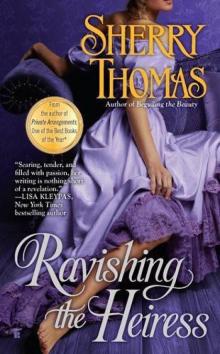 Ravishing the Heiress ft-2
Ravishing the Heiress ft-2 The Immortal Heights
The Immortal Heights The Hidden Blade
The Hidden Blade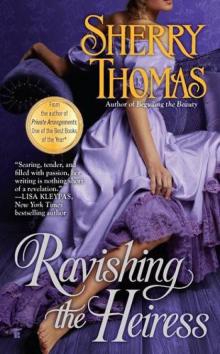 Ravishing the Heiress
Ravishing the Heiress Tempting the Bride
Tempting the Bride The Luckiest Lady in London
The Luckiest Lady in London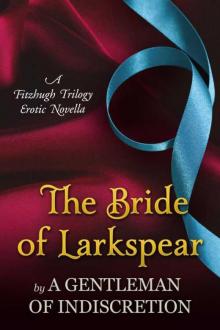 The Bride of Larkspear: A Fitzhugh Trilogy Erotic Novella
The Bride of Larkspear: A Fitzhugh Trilogy Erotic Novella Claiming the Duchess
Claiming the Duchess The One in My Heart
The One in My Heart His At Night
His At Night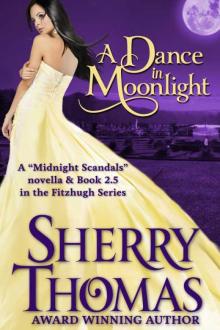 A Dance in Moonlight
A Dance in Moonlight A Conspiracy in Belgravia
A Conspiracy in Belgravia Not Quite a Husband
Not Quite a Husband